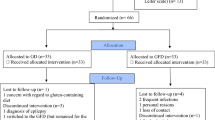Abstract
In 1998, the English physician Andrew Wakefield suggested that the MMR vaccine insults the guts of children who then regress developmentally and become autistic. Although his research did not provide firm evidence for this hypothesis, many believe that (a) the MMR vaccine can cause autism; (b) children with autism typically have gastrointestinal problems; and, (c) a necessary component of treating autism is “treating the gut” through dietary restrictions. Research has subsequently shown that Wakefield’s hypothesis is unquestionably false, children with autism are not more likely to have gastrointestinal problems, and there is no sound evidence that diets are a valid treatment for autism. This paper will critically review these topics.
Similar content being viewed by others
References
Afzal, M. A., Ozoemena, L. C., O’Hare, A., Kidger, K. A., Bentley, M. L., & Minor, P. D. (2006). Absence of detectable measles virus genome sequence in blood of autistic children who have had their MMR vaccination. Journal of Medical Virology, 78, 623–30.
Ahearn, W. H., Castine, T., Nault, K., & Green, G. (2001). An assessment of food acceptance in children with autism or pervasive developmental disorder — not otherwise specified. Journal of Autism and Developmental Disorders, 31, 505–512.
Andrews, N., Miller, E., Taylor, B., Lingam, R., Simmons, A., Stowe, J., & Waight, P. (2002). Recall bias, MMR, and autism. Archives of Disabled Children, 87, 493–494.
Black, C., Kaye, J., & Jick, H. (2002). Relation of childhood GI disorders to autism: Nested case-control study using data from the UK General Practice Research Database. British Medical Journal, 325, 419–421.
Buie, T., Campbell, B., Fuch III, G., Furuta, G., Levy, J., VandeWater, J., et al. (2010). Evaluation, diagnosis, and treatment of gastrointestinal disorders in individuals with ASDs: A consensus report. Pediatrics, 125, S1–S18.
Cade, R., Privette, M., Fregley, M., Rowland, N., Sun, Z., Zele, V., et al. (1999). Autism and Schizophrenia: Intestinal disorders. Journal of Nutritional Neuroscience, 3, 57–72.
Cianferoni, A., & Spergel, J. M. (2009). Food allergy: Review, classification and diagnosis. Allergology International, 58, 457–466.
Dales, L., Hammer, S. J., & Smith, N. J. (2001). Time trends in autism and in MMR immunization coverage in California. Journal of the American Medical Association, 285, 1183–1185.
Deer, B. (2004, February 22). Revealed: MMR Research Scandal. Retrieved March 18, 2010 from http://briandeer.com/mmr/lancet-deer-1.htm.
Deer, B. (2010, January 31). ‘Callous, unethical and dishonest’: Dr Andrew Wakefield. Retrieved February 5, 2010 from http://www.timesonline.co.uk/tol/news/uk/health/article7009882.ece.
D’Souza, Y., Fombonne, E., & Ward, B. J. (2006). No evidence of persisting measles virus in peripheral blood mononuclear cells from children with autism spectrum disorder. Pediatrics, 118, 1744–1745.
Eldevik, S., Hastings, R. P., Hughes, J. C., Jahr, E., Eikeseth, S., & Cross, S. (2009). Meta-analysis of early intensive behavioral intervention for children with autism. Journal of Clinical Child & Adolescent Psychology, 38, 439–450.
Feingold, B. F. (1975). Why your child is hyperactive. New York: Random House.
Fishman, L., Rappaport, L., Cousineau, D., & Nurko, S. (2002). Early constipation and toilet training in children with encopresis. Journal of Pediatric Gastroenterology and Nutrition, 34, 385–388.
Fombonne, E. & Chakrabarti, S. (2001). No evidence for a new variant of measles-mumps-rubella-induced autism. Pediatrics, 108, E58.
Health Protection Agency (2009, February 9). Agency publishes annual measles figures for 2008. Retrieved March 18, 2010 from http://www.hpa.org.uk/webw/HPAweb&HPAwebStandard/HPAweb_C/1233822584984?p=1231252394302.
Honda, H., Shimizu, Y., & Rutter, M. (2005). No effect of MMR withdrawal on the incidence of autism: A total population study. Journal of Child Psychiatry and Psychology, 46, 572–79.
Ibrahim, S. H., Voigt, R. G., Katusic, S. K., Weaver, A. L., & Barbaresi, W. J. (2009). Incidence of gastrointestinal symptoms in children with autism: A population-based study. Pediatrics, 124, 680–686.
Kaye, J., del Mare Melero-Montes, M., & Jick, H. (2001). Mumps, measles and rubella vaccine and the incidence of autism recorded by general practitioners: A time trend analysis. British Medical Journal, 322, 460–463.
Mrozek-Budzyn, D., Kieltyka, A., & Majewska, R. (2009). Lack of association between measles-mumps-rubella vaccination and autism in children: A case-control study. The Pediatric Infectious Disease Journal, 63, 107–112.
National Institutes of Health. (1996). NIH Publication No. 963572, printed 1994, reprinted1996. Booklet. 44p. Retrieved September, 1997 from http://www.nimh.nih.gov/publicat/adhd.cfm#adhd6.
Royal Free Hospital. (1998, February 27). New research links autism and bowel disease. Retrieved March 17, 2010 from http://briandeer.com/mmr/royal-free-press-1998.pdf.
Seidel, K. (2010, March 14). Omnibus Autism Proceedings: Resources and Documents. Retrieved March 14, 2010 from http://neurodiversity.com/weblog/article/189/.
Taylor, B., Miller, E., Lingam, R., Andrews, N., Simmons, A., & Stowe J. (2002). MMR vaccination and bowel problems or developmental regression in children with autism: Population study. British Medical Journal, 324, 393–396.
Wakefield, A. J., Murch, S. H., Anthony, A., Linnell, J., Casson, D. M., Malik, M., et al. (1998). Ileal-lymphoid-nodular hyperplasia, non-specific colitis, and pervasive developmental disorder in children. The Lancet, 351, 637–41. RETRACTED.
Wise, J. (2001). Science vs “scaremongering” over measles-mumps-rubella vaccine. Bulletin of the World Health Organization, 79, 272.
Author information
Authors and Affiliations
Rights and permissions
About this article
Cite this article
Ahearn, W.H. What Every Behavior Analyst Should Know About the “MMR Causes Autism” Hypothesis. Behav Analysis Practice 3, 46–50 (2010). https://doi.org/10.1007/BF03391757
Published:
Issue Date:
DOI: https://doi.org/10.1007/BF03391757




